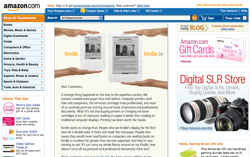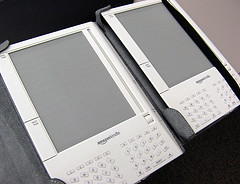http://www.youtube.com/watch?v=c6j8EiWIVZs
Books, with the exception of our critiquing issues with the Kindle and E-Book readers, don’t usually appear on Gadget Wisdom. They aren’t gadgets, and while we are a tech blog, the book isn’t usually thought of as tech.
But think about it…aren’t they? Johannes Gutenberg, in the 15th century, invented the first viable printing press(which was first used in the moneymaking enterprise of printing indulgences for the Church, but that is another story). The history of printing, as a man demonstrating a printing press at a Historical Village showed us, is full of technology. Remember that before printing, books would have to be copied by hand.
More recently, we’ve talked about On-Demand book printing machines, which we believe is the future of bookstores.
But today, August 28th, Reading Rainbow comes to the end of its 26-year run on television. The show, started in 1983, was hosted by Levar Burton(best known to most of you as that blind guy from Star Trek, or that Roots thing). During the show, kids gave their own reviews of books, and Burton featured a real-life adventure inspired by a book. No one will put up the money to renew the show’s broadcast rights, thus dooming it.
The fallacy, according to the people at PBS, is that the show was designed to teach children a love of reading, and they want to put their money into teaching kids basic reading skills. Unlike many children’s shows…Reading Rainbow was not torture. Many children’s programs make us cringe. Anyone over the age of ten who watches them with youngsters wants to claw his or her eyes out pretty early on. We can thank Levar Burton, who spearheaded the show, for speaking simply, so that children could understand, but keeping quality high.We can count Reading Rainbow on the list of children’s programs we would still watch today.
It brings up the larger question of the future of books entirely. Without fostering a lifelong love of learning and of books, children in an increasingly technological world will let them go by the wayside. Already children are demanding multimedia education over reading, so a world in which the written word because less and less prominent is a horrible possibility.
From a technical standpoint, nothing digital replaces the feeling and ease of a real book, even the minute we spent looking at the Kindle. We continue to add bookshelves to our home, and reading on a computer screen is something we do, it doesn’t have the same relaxing appeal. It is the relative inexpensive nature and ease of use of books that has made reading and education accessible to all of us. Technology surrounding them may continue to improve, but books are here to stay for the long-term…if only we get a new generation interested in reading. But, as Levar Burton said, “you don’t have to take our word for it.”



![Reblog this post [with Zemanta]](http://img.zemanta.com/reblog_e.png?x-id=0f493b92-eb73-487c-ad91-734115747aeb)


![Reblog this post [with Zemanta]](http://img.zemanta.com/reblog_e.png?x-id=4d1d8594-f904-4c7a-942c-bb8fc29bfdda)


![Reblog this post [with Zemanta]](http://img.zemanta.com/reblog_e.png?x-id=2a48ad77-0f21-48ab-9566-c5b3fdb4a53a)


![Reblog this post [with Zemanta]](http://img.zemanta.com/reblog_e.png?x-id=f0dbd97a-0480-4e07-94fd-368fde8cc416)


![Reblog this post [with Zemanta]](http://img.zemanta.com/reblog_e.png?x-id=747260c7-bcb6-40bb-8d0b-b11676719cb7)


![Reblog this post [with Zemanta]](http://img.zemanta.com/reblog_e.png?x-id=1a20142d-d75a-4944-a14c-864798a5c6d4)